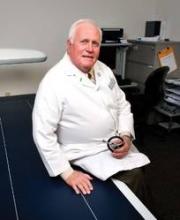When Don W. Powell was a medical student at the University of Alabama at Birmingham, he had the good fortune to work with a man who had just revolutionized gastroenterology.
Dr. Powell’s mentor, Dr. Basil Hirschowitz, is best known for inventing the flexible fiberoptic endoscope, "which made gastroenterology the specialty it is today," Dr. Powell said in an interview. "But he was also very much interested in how the stomach secretes acid."
So, too, was Dr. Powell, who dedicated the first few years of his 4-decade research career, which has been conducted under continuous funding from the National Institutes of Health, to studying processes governing acid production, and eventually the transport of water and electrolytes in the intestine. This, in turn, led him to study the pathophysiology of inflammatory bowel and diarrheal diseases.
At the University of Texas Medical Branch (UTMB) in Galveston, where he is now director of the Institute for Translational Sciences-Clinical Research Center and professor of internal medicine and neuroscience and cell biology, Dr. Powell began focusing on the study of intestinal stromal cells and how they contribute to intestinal repair. This brought him to his current research focus on the complex signaling pathways of cyclooxygenase-2, and its roles both in disease pathogenesis and normal gut function. Recently, his group has discovered an immunologic function in these cells.
"Most of my research has been fairly basic – I didn’t do much clinical research," Dr. Powell said. "Which is kind of ironic, because I now run a huge clinical research department."
In 2001, Dr. Powell was awarded the American Gastroenterological Association’s (AGA’s) Julius Friedenwald Medal, and was the association’s president in 2002. That same year he received the John P. McGovern Award in Oslerian Medicine from UTMB, and in 2003, he was elected a fellow of the American Association for the Advancement of Science. In 2005, Dr. Powell received the AGA Mentors Research Scholar Award, and in 2009, the annual Don W. Powell lecture was established by the AGA Institute. A UTMB professorship was established in his name this year.
To his current and former colleagues, several of whom acknowledge being fuzzy on the particulars of his biochemical research, Dr. Powell is simply "Don," an attentive mentor and talented leader who has become something of a living treasure to UTMB.
"It doesn’t matter if you are a medical student, a resident, or a colleague, he takes time with you. I really mean this. Your needs and your career goals are his focus," said Dr. J. Marc Shabot, professor of medicine at UTMB and a gastroenterology colleague of Dr. Powell’s for more than 20 years, in an interview. "So many times you see people in academia who just don’t make time for others."
As with his own early mentor, Dr. Hirschowitz, Dr. Powell’s influence on gastroenterology is deeply felt through the legions of research physicians he’s trained. Dr. G. Nicholas Verne, now professor and director of the division of gastroenterology and hepatology at UTMB, recalled in an interview how, as a junior investigator 10 years ago, "it was daunting to know if I was on the right track. At an AGA career-development conference, Don spent the whole afternoon with me going over my research."
Dr. QiQi Zhou of the department of gastroenterology at UTMB, calls Dr. Powell a "father type" for his warmth and approachability. Dr. Zhou admits that he would be the kind of father given to constant challenging with pointed questions.
In appreciation of Dr. Powell’s gifts as an educator, and to celebrate his research career, Dr. Verne, Dr. Zhou, Dr. Shabot, and other department colleagues at UTMB have called on more than a dozen of Dr. Powell’s current and former colleagues, students, and collaborators to present on a diverse array of gastroenterology topics in Galveston Oct. 19 and 20, at an event titled the Don Powell Decades. Presenters will touch on topics ranging from C. difficile infections to diverticulitis to gastroenterology in the context of global public health.
"All of the speakers are people I have mentored," said Dr. Powell, who described his approach to mentoring as flexible. "I don’t always mentor people doing the same kind of research I do – you can be just as effective in other areas of research and academic development," he said. "You have to be willing to let people make their way and give them advice when they need it. I really don’t know what the formula is, but it seems to work."
Among the presenters at the conference will be Dr. Tadataka Yamada, president of the global health program at the Bill and Melinda Gates Foundation, who has collaborated with Dr. Powell on some important gastroenterology textbooks, including multiple editions of both "Atlas of Gastroenterology" (Hoboken, N.J.: Wiley-Blackwell, 2003) and "Textbook of Gastroenterology" (Wiley-Blackwell, 2009).



